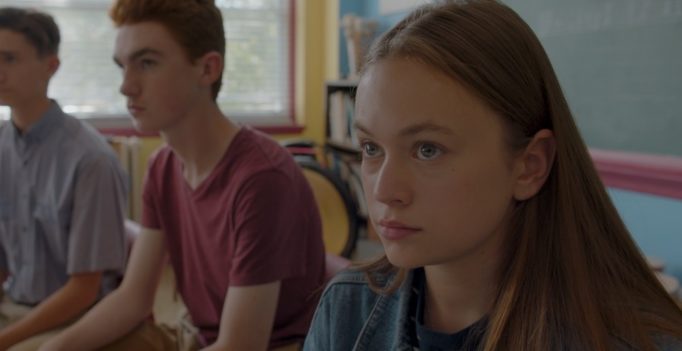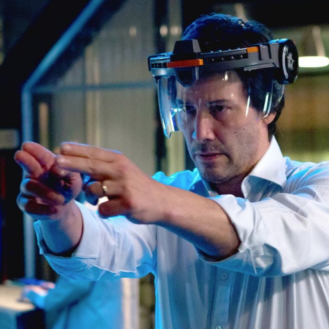Written and directed by Nicole Dorsey, Black Conflux gets many things right. Aesthetically, it is a compelling film that makes use of visual motifs to link the lives of two very different characters.
Jackie (Ella Ballentine) is a fifteen-year-old girl with a difficult home life trying to find her place. Dennis (Ryan McDonald) is a lonely, alienated man struggling to hold down a warehouse job and plagued by troubling visions of women he cannot have. As the title suggests, this is a story about convergence. The image of two rivers eventually joining together appears multiple times throughout, forecasting the inevitable intersection of Jackie and Dennis’ journeys.
The scenes with Jackie are well-paced. Tension builds slowly, and the final moments of the film are harrowing and unpredictable. Dorsey juggles heavy topics such as patriarchy and violence toward women, but Black Conflux resists the temptation to present the teenage heroine as a victim and refuses to deny her agency. Though Jackie has moments of uncertainty and even reluctance, she is self-assured and capable.
However, Dennis’ story is less carefully constructed. Ryan McDonald delivers a solid performance, but never quite manages to make the character sympathetic. Overall, and especially compared to Jackie, Dennis is under-developed. He is deviant and misogynistic, but the audience isn’t given much information about why he is the way he is, or what specific mental illness he might be suffering from. As such, he becomes little more than a generic lonely guy verging on middle age – albeit a frustrated and vaguely threatening one.
There are points, as well, where Black Conflux is a bit too heavy handed and obvious. The dialogue is frequently on-the-nose, and the themes are spelled out rather bluntly. Most of the best moments are silent, or nearly: Jackie dancing in front of her mirror, revelling in the discovery of her own beauty; Dennis washing up after dinner, listening to his sister in the other room.
Black Conflux is as much a period piece at it is a coming-of-age story; the costumes, sets, and cars are well suited to the 1980s setting without feeling over-done or cliché. Despite the pastel-pink eye shadow, the film is rooted in a depiction of girlhood that feels both relatable and mundane.
While the temporal setting is clearly established, the film lacks a clear sense of place. Besides a few off-hand references to “the shore”, there is little about Black Conflux that hints at the Newfoundland setting. It could just as easily have been about a teenage girl in small-town Nova Scotia, or even Ontario. The choice to set the film in Newfoundland feels arbitrary, rather than driven by a desire to tell a distinctly Newfoundland story. There is a missed opportunity here to showcase not just another decade – but another decade from a unique cultural and geographic perspective.
Though it is a bit half-baked at points, Black Conflux is an impressive feature debut and a surprisingly tender coming of age story.
**********
Do You Tweet? Follow These Tweeple:
Shannon Page: @ShannonEvePage





Be the first to comment